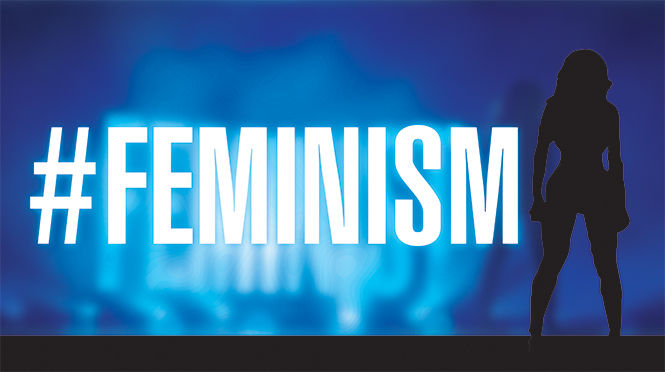Opinion: The Stigma of the F-Word
On Aug. 24, approximately 12 million American homes saw one word come across their television screen during the MTV Video Music Awards: FEMINIST.
Beyoncé Knowles stood center stage with the word in bright white letters behind her. Nigerian feminist author Chimamanda Ngozi Adichie, featured in the pop-diva’s song ***Flawlesss, narrated the definition of the powerful word that stood behind the even more powerful pop sensation.
According to Jessica Bennett’s article in TIME, Sunday night had the sixth highest volume of conversation about feminism on Twitter, all revolving around Beyoncé’s performance.
“The title [of being a feminist] has a lot of baggage associated with it. A lot of that baggage is simply inaccurate,” said Dr. Suzy D’Enbeau, Assistant Professor of Communication Studies. D’Enbeau has a Ph.D. from Purdue University in organizational communication with an emphasis in feminist organizing.
Along with having published research on the topic of feminism, D’Enbeau teaches the Gender and Communication course, a course that satisfies a Global Diversity Requirement and focuses on gender issues.
“What history has told us is that there are many different types of feminism, I can’t even really count them all,” D’Enbeau said. “There are many different ways to approach feminism, to advocate feminism, to live feminism, depending on your perspectives, your values, your believes, your standpoint.”
A core value of all feminist movements and beliefs is fighting oppression, D’Enbeau said. Feminists do not just focus on the oppression of women, but of any group of people that has their power or agency taken from them.
“I think feminism has become sort of a dirty word in today’s society, and with celebrities coming out and advertising that feminism is completely necessary, more people are coming around to the idea that feminism is something we need today,” junior public relations major Elaina Enselein said.
Enselein said she has considered herself a feminist for a few years, but did not truly understand the movement as a whole until a year and a half ago.
Although Beyoncé has recently brought the topic into the public sphere, feminism has been embraced, researched and debated for years. One element that may not be associated with feminism is critical to the movement’s success: men.
“The young men that I encounter in my classroom are totally into equality and they get very defensive if they perceive that feminism is all about male bashing, understandably,” said Dr. D’Enbeau. “With a lot of young men, if you tell them what feminists stand for they will say they agree with it – it’s just the title that has all the baggage associated with it.”
D’Enbeau said that the myth of feminists bashing men is a common one she comes across in her classroom. The definition read by Adichie in Beyoncé’s song states that a feminist is a “person who believes in the social, political and economic equality of the sexes.”
That message is one that easily gets lost in translation and images of bra-burning, crazed feminists that are so often portrayed in society today.
“That didn’t happen, by the way,” said D’Enbeau as she laughed. “Feminists never actually marched around burning bras.”
Believing in feminist ideals does not mean that men are inferior to women or that women are demanding rights that men themselves don’t have, it’s simply believing that equality should come to everyone in the same forms, regardless of gender.
Beyoncé Knowles embraces this attitude, dominating the music industry and creating her own empire along the way.
“I don’t know that I would say [her performance] had a specific local impact to Kent, but more a localized impact to our generation. People adore ‘Queen B’ and when she says things people consider them in a different light. Her popularity exposes more people to feminism,” said Enselein.
Contact Erin Zaranec at [email protected].


